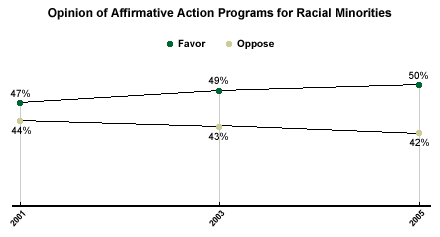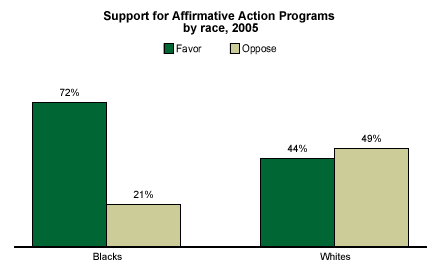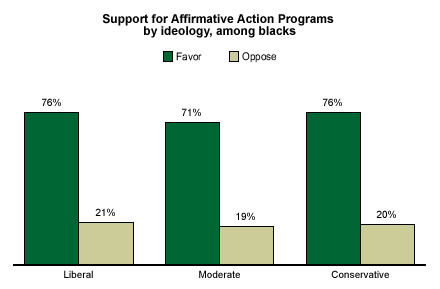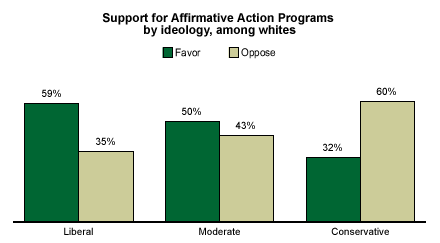Affirmative action programs remain one of the more controversial social policies in the United States. The Supreme Court ruled in 2003 that race can be a factor in college admissions, as long as it is not the overriding factor. As a whole, the American public is quite divided about affirmative action programs designed to help racial minorities gain admission to colleges and to secure jobs. As one might expect, whites' and blacks' views on the policy differ.
Overall Support for Affirmative Action
Gallup's annual Minority Rights and Relations poll* finds 50% of Americans favor "affirmative action programs for racial minorities," while 42% oppose such programs. Previous surveys in this series have shown similar results, with slightly more Americans expressing support than opposition.

Support for affirmative action has been known to vary depending on how the question is worded, particularly when the question describes the programs in more detail. Surveys conducted in the past five years by the major polling firms show a range of support from as low as 38% (when the term "racial preferences" is used) to as high as 64%.
Regardless of the wording, all polling on affirmative action shows blacks overwhelmingly support it. In the latest Gallup Poll, 72% of blacks say they favor affirmative action programs, while only 21% are opposed. Among whites, the story is different. Whites are much more divided, with opponents outnumbering supporters by a 49% to 44% margin. The results for both whites and blacks have been consistent over time.

Those views likely stem from the belief among a majority of whites (59%) that blacks in this country have equal job opportunities with whites, while only 23% of blacks agree. Roughly three in four blacks believe that they do not have equal job opportunities in this country.
Black Versus White Support for Affirmative Action
What might explain the differences in support for affirmative action by race? An analysis of the Minority Rights and Relations poll data shows that blacks' support for affirmative action is consistent even for those whose political belief systems differ, suggesting personal politics has little to do with their views on the issue. However, for whites, support for affirmative action programs is highly related to political ideology.
Among blacks, 76% of self-described conservatives, 71% of moderates, and 76% of liberals favor affirmative action programs for minorities.

Among whites, on the other hand, most conservatives oppose affirmative action, while more moderates and liberals support than oppose it. Fifty-nine percent of liberal whites, compared with 50% of moderate whites and 32% of conservative whites say they favor affirmative action programs for minorities.

While there appear to be slight differences for blacks by party, the differences are not statistically significant.
A special statistical analysis (the results of which are not shown here) that allows one to predict Americans' support for affirmative action based on their demographic and political characteristics shows that race is by far the strongest predictor. Ideology is the next strongest, but its effect is only half as large as that found for race.
When the same analysis is run just among blacks, thus controlling for their race, none of the other demographic characteristics (such as gender, age, or education) or political characteristics (ideology and partisanship) is predictive of their support. Only household income comes close to being a significant predictor. Thus, affirmative action views among blacks appear to be almost entirely influenced by their race (or more precisely, the experiences and characteristics that blacks as a group tend to share).
Bottom Line
One of the reasons for the controversy over affirmative action is that it divides the American public. Obviously, blacks and whites differ in their views, and Hispanics also tend to be much more supportive than whites, though not as supportive as blacks. Even among whites, views of affirmative action are polarized, but along political lines.
*Results are based on telephone interviews with 2,264 national adults, aged 18 and older, conducted June 6-25, 2005, including oversamples of blacks and Hispanics that are weighted to reflect their proportions in the general population. For results based on the total sample of national adults, one can say with 95% confidence that the maximum margin of sampling error is ±5 percentage points.
Results for the sample of 807 non-Hispanic whites, aged 18 and older, are based on telephone interviews conducted June 6-25, 2005. For results based on the total sample, one can say with 95% confidence that the margin of sampling error is ±7 percentage points.
Results for the sample of 802 blacks, aged 18 and older, are based on telephone interviews conducted June 6-25, 2005. For results based on the total sample, one can say with 95% confidence that the margin of sampling error is ±5 percentage points.
